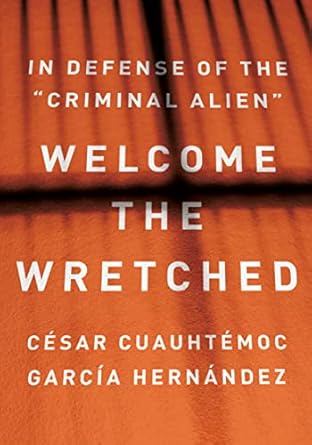 |
Through the stories of newcomers like José Inéz García Zárate, 21 Savage, Sandra Castañeda, and others, García Hernández displays the flaws, inconsistencies, outright cruelty, and vindictiveness in the exploitation of policies and enforcement actions. The book offers a powerful critique of the prejudices embedded in defining criminality, the questions of citizenship and rights, and how violent and harmful rhetoric misalign with American values.
“Welcome the Wretched” is a timely piece, even as it reads almost like a time capsule as we face the current assaults against the demonized “criminal alien.” García Hernández offers us a nuanced look at the policing practices of the Department of Homeland Security (DHS) and the role of local police.
García Hernández writes from a historical perspective, explaining case law, the documented incidents of inconsistencies and abject racism, and the sociopolitical climate that fueled immigration raids. I appreciate how he broke down the components of the “immigration industrial complex” that involves corporate actors like Amazon and Palantir, a company run by billionaire kingmaker Peter Thiel. He shows the complicity of the U.S. Congress in enabling taxpayer dollars to fund private companies to profit from the misery and dehumanization of others.
Another strength of the book is how García Hernández integrates his own lived experiences and observations as a Brown immigrant in academia, and the reflexivity required to write courageously about the errant contradictions of shared values and laws. By reconstructing the complicated, contradictory immigration laws tied to criminal law, he advocates for opposing injustice and upholding human rights.
 |
| Buy from Bookshop |